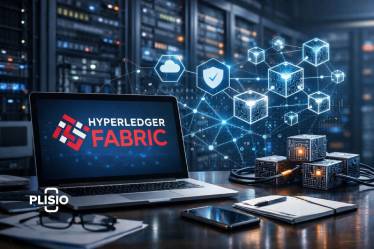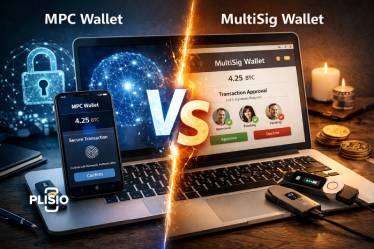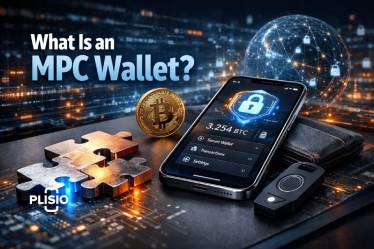Is This Metamask Wallet Safe and Legit?
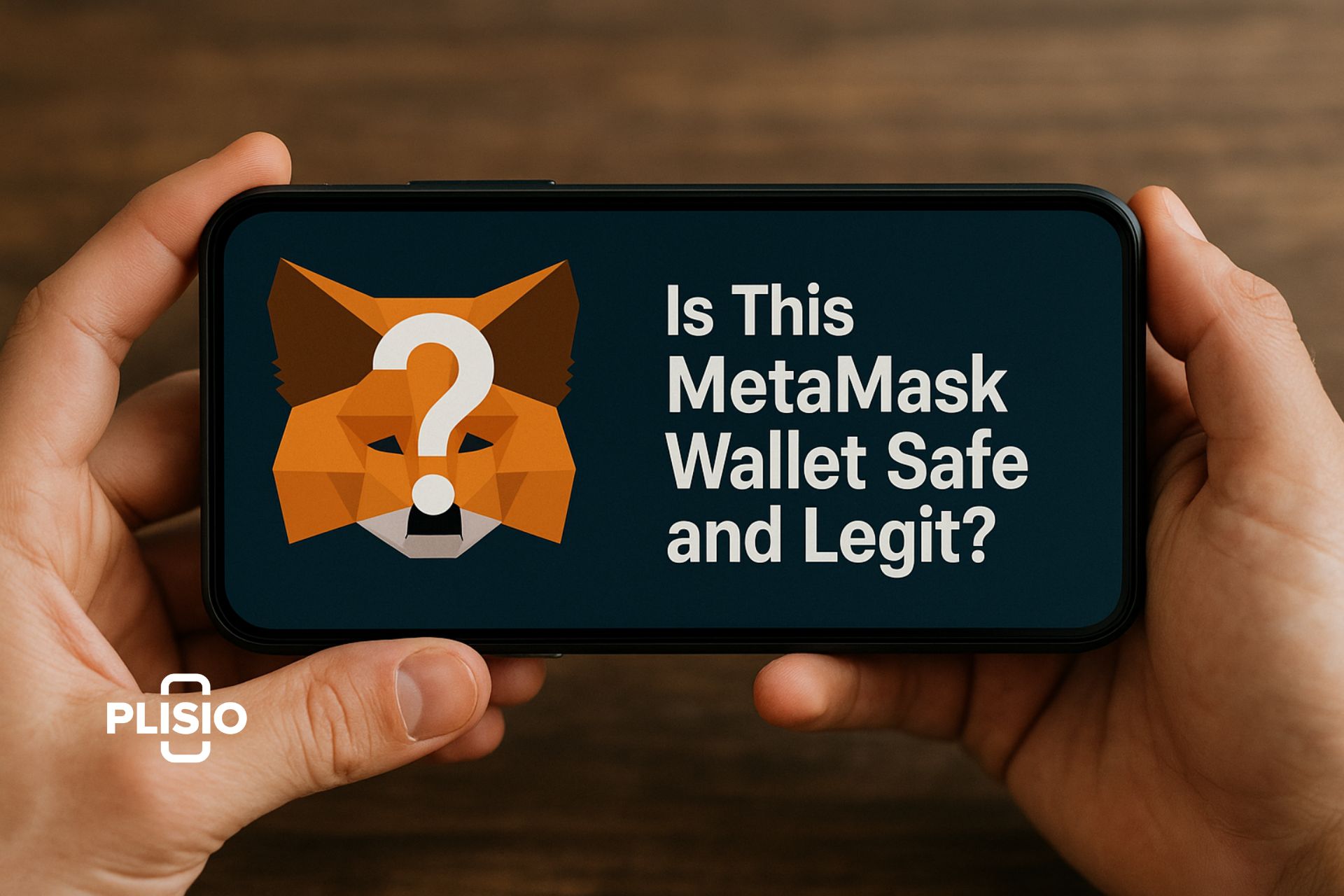
MetaMask is one of the most widely recognized names in the crypto world, often compared to alternative wallets to MetaMask. Think of it as a digital cryptocurrency wallet, much like the wallet in your pocket—but instead of holding cash, it keeps your Ethereum and other digital tokens secure. The MetaMask extension turns your browser into a gateway for decentralized apps (dApps), DeFi services, and NFTs, showcasing how MetaMask is a cryptocurrency wallet that facilitates access to these platforms. In short, MetaMask acts as your passport to the decentralized web, emphasizing its role as a software wallet.
By 2025, the MetaMask wallet is trusted by more than 35 million monthly active users Worldwide, MetaMask is a digital wallet that connects users to the vast world of decentralized finance. Since MetaMask was first released, it has processed billions of dollars in transactions every month. This growth makes MetaMask one of the most popular crypto wallets available today, alongside alternatives like Coinbase Wallet and Trust Wallet.
MetaMask Review: Why MetaMask Wallet Is Popular
Unlike traditional wallets that simply store funds, MetaMask allows users to buy, swap, and interact with decentralized applications directly. Whether you want to stake tokens, explore NFTs, or use a DeFi lending platform, you can connect your wallet to hundreds of decentralized apps with just a few clicks. The combination of ease of use and strong MetaMask security features has made it a go-to choice for many investors seeking a reliable wallet offer, as MetaMask is developed by ConsenSys.
You can obtain MetaMask as a mobile app or a browser extension, which makes it easy to install on a lot of different devices. It works with Ethereum and several other blockchains that use the EVM, such as Arbitrum, Optimism, and Base, which are well-known Layer 2 networks. People that use crypto claim that MetaMask is straightforward to use and has good security features. More than 40% of those who use MetaMask now use Layer 2 solutions to save money on gas expenses.
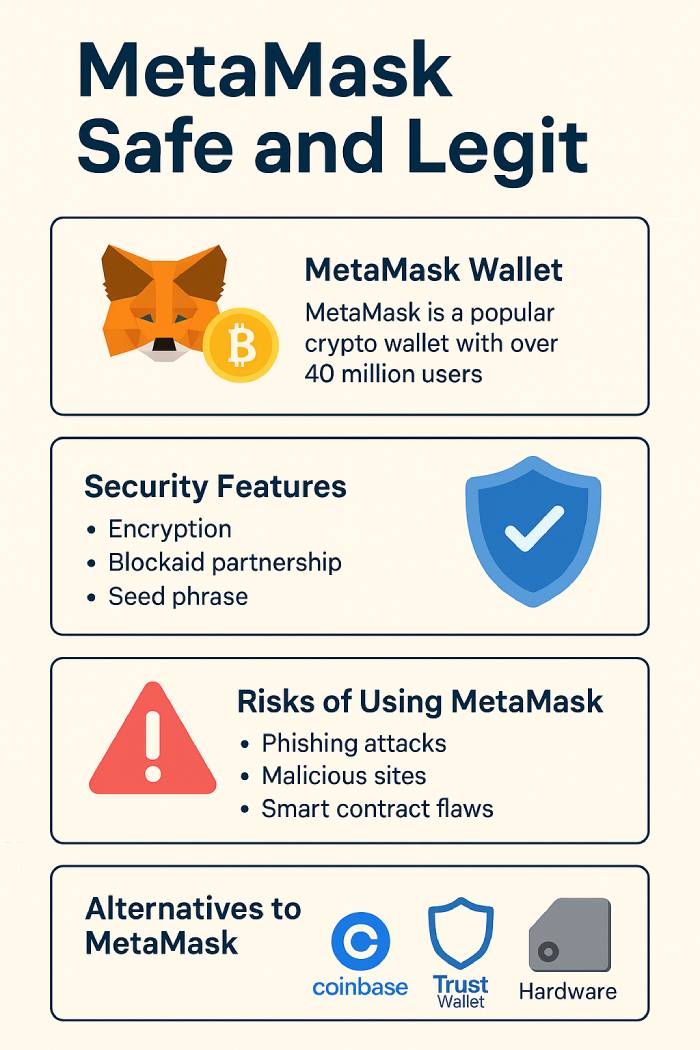
Is MetaMask Safe and Legit?
A lot of new users want to know if MetaMask is secure and real. Yes, most of the crypto community thinks that MetaMask is safe and real. In 2025, surveys show that more over 75% of those who use DeFi utilize MetaMask as their main crypto wallet. It's vital to know that MetaMask is a hot wallet, which means it is always connected to the internet. Because of this, it is less secure than cold wallets (hardware wallets) like Ledger or Trezor, which are thought to be safer than any wallet used for internet transactions.
MetaMask employs strong security measures to keep your assets safe:
- Encryption Wallet data stored on MetaMask servers is encrypted with a private key only you control, ensuring that MetaMask is a digital cryptocurrency wallet that prioritizes security.
- Seed Phrase When you create a new MetaMask account, you’re given a 12-word seed phrase, which acts as a password for your MetaMask wallet. This phrase is the key to recovering your MetaMask wallet if you lose access, making your phrase safe for wallet recovery.
- Blockaid: MetaMask has partnered with Blockaid to introduce a scam-protection tool. It lets you simulate a transaction before signing, helping you avoid fake MetaMask sites or malicious contracts.
Even with these protections, MetaMask doesn’t have access to your wallet or your private key, ensuring that MetaMask does not store sensitive information. MetaMask is a non-custodial wallet, so the responsibility for keeping your assets safe rests entirely with you. For the highest level of safety, many investors use MetaMask with hardware wallets.
MetaMask Wallet: Centralized or Decentralized?
MetaMask is a bitcoin wallet that is decentralized and not held by a single person. That implies the company that makes MetaMask (Consensys) doesn't have the keys to your coin; you do. You get a recovery phrase when you set up a MetaMask wallet, and it's vitally important to keep it safe. MetaMask wallets don't ask for personal information like Coinbase accounts do. This makes them popular among people who value their privacy and want to utilize a MetaMask wallet.
Benefits of MetaMask Wallet
Benefits of MetaMask:
- Quick and simple setup for new wallet creation.
- Supports ERC-20 tokens, NFTs, and many decentralized apps.
- Works seamlessly as a MetaMask browser extension and mobile app.
- Gas fee customization and advanced token detection are features that MetaMask provides.
- Compatible with hardware wallets like Ledger and Trezor.
- MetaMask offers robust security features for DeFi and NFT users, making it a preferred wallet offer for many in the crypto community.
Drawbacks and Risks of Using MetaMask: While many users find MetaMask legit and safe, it's important to be aware of potential drawbacks and risks.
- Limited MetaMask support compared to wallets like Coinbase Wallet.
- As a hot wallet, it carries more risks than a cold wallet.
- MetaMask doesn’t currently have built-in two-factor authentication (2FA), which some hardware wallets with MetaMask offer as an additional security layer.
- Phishing attacks and fake MetaMask websites remain a threat.
- Confusing for beginners when switching networks.
Risks of Using MetaMask
Most security issues come from outside MetaMask itself:
- Phishing scams are a common threat, so it's essential to ensure that you're using a MetaMask wallet to avoid falling victim.: Fake emails or fake MetaMask sites trick users into revealing their seed phrase. MetaMask will never ask for your private key or seed phrase directly, ensuring that your software wallet remains secure.
- Malicious dAppsSome decentralized applications can contain vulnerabilities or malicious code, so always use a wallet like MetaMask that offers robust security features.
- Browser risks: Since MetaMask is a browser extension, it relies on the security of your browser.
To stay safe, always download MetaMask from the official MetaMask website, avoid suspicious links, and consider pairing MetaMask with a hardware wallet.
MetaMask Wallet Fees 2025
MetaMask doesn’t charge for creating a wallet, storing coins, or receiving tokens. But like every crypto wallet, it does require gas fees when sending crypto. These are determined by the blockchain, not MetaMask.
Thanks to Ethereum upgrades like proto-danksharding (EIP-4844), gas fees in 2025 are much lower than in past years. A simple transfer now costs, and whether MetaMask users find this cost acceptable often depends on their transaction needs. $0.15 to $0.50While more complex DeFi transactions can still cost a few dollars, using MetaMask as a browser extension helps streamline the process. Cross-chain swaps through MetaMask incur a fee, but the convenience of using a wallet like MetaMask makes it worthwhile. 0.875% fee, and buying crypto with fiat currency carries third-party processor fees, usually between 2.5% and 4.5%.
MetaMask Security Measures: How to Keep Your Wallet Safe
Here are some basic MetaMask security measures:
- Use a strong, unique password for your MetaMask account and store it offline.
- Never share your seed phrase and keep it somewhere safe.
- Connect your MetaMask wallet only to trusted decentralized applications.
- Always check that you’re on the official MetaMask website.
- For larger investments, connect your MetaMask with hardware wallets to enhance security, unlike MetaMask alone.
MetaMask Legit: Is It Legal in the US?
Yes, MetaMask is legal in the US. Unlike custodial wallets like Coinbase Wallet, MetaMask doesn’t require KYC verification. However, regulators are discussing new rules for decentralized apps and non-custodial wallets, so this could change in the future.
How Does MetaMask Work?
MetaMask is more than a software wallet—it acts as a Web3 browser. Once you download MetaMask, you can connect your wallet to decentralized apps like Uniswap, Aave, or OpenSea, showcasing that MetaMask is compatible with various platforms. Reports from 2025 show that MetaMask is widely regarded as a leading wallet in the DeFi space. over 70% of MetaMask users interact with at least one decentralized application each month.
Final Thoughts: MetaMask Safe and Legit in 2025
Many people think of MetaMask as a safe, real, and popular crypto wallet. MetaMask is a hot wallet, which means it's more likely to be hacked, but it has strong security features including encryption, seed phrases, and Blockaid integration. People think MetaMask is safe to use, especially when used with a hardware wallet.
If you want to use a different wallet than MetaMask, Coinbase Wallet or Trust Wallet might work for you. However, MetaMask is a well-known cryptocurrency wallet with a lot of features. But for a lot of people, MetaMask is the best and most flexible option in 2025. MetaMask is secure for everyone, whether you're new to crypto or already deep into DeFi. It keeps your assets safe while letting you utilize decentralized apps without any problems.

